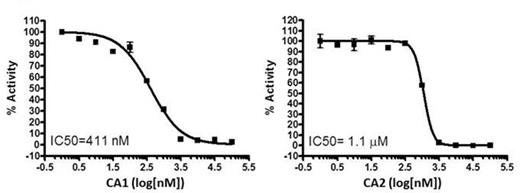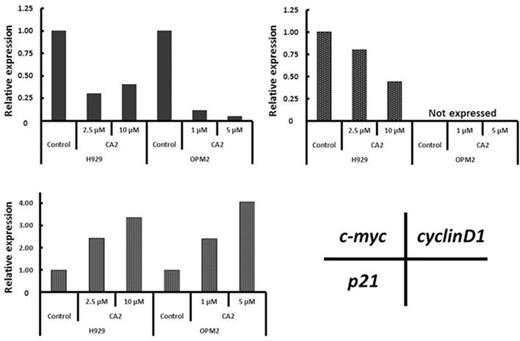Abstract
New molecular targeting agents against multiple myeloma (MM) have been developed and the prognosis of patients with MM has been improved. However, MM still remains an incurable disease. It is important to continue to investigate new therapeutic agents based on the biology of MM cells. Bromodomain (BRD4) inhibitors such as JQ-1 and I-BET151 have been shown as candidates for a molecular targeting agent against MM. In this study, we searched for chemical compounds inhibiting BRD4 binding ability and we investigated their effects on MM cell proliferation. We identified novel compounds CA1 and CA2 as a BRD4 inhibitor using an alpha screening assay. The IC50 values of the binding ability of recombinant human BRD4-BD1-BD2 of CA1 and CA2 are 0.44 and 1.1 mM, respectively (Figure 1). We next investigated the effects of CA1 and CA2 on MM cell lines (MM.1s, AMO-1, NCIH929, and OPM-2 cells). Analyses with MTT assay showed that these compounds inhibited the proliferation of MM cells in a dose-dependent manner. c-myc and cyclinD1 mRNA transcripts were decreased by the treatment of CA1 and CA2, while, p21 mRNA transcripts were increased (Figure 2). In flow cytometric analysis, cell cycle arrest occurred in a G1 phase and apoptosis was induced. Western blotting analysis showed the decrease of c-myc protein levels as well as the cleavage of caspase-3. In conclusion, novel BRD4 inhibitors CA1 and CA2 inhibited binding of BRD4 to its ligands, resulting in the suppression of MM cell proliferation and the induction of apoptosis via the caspase activation.
Yoshioka:ConverGene LLC: Employment. Strovel:ConverGene LLC: Employment.
Author notes
Asterisk with author names denotes non-ASH members.



This feature is available to Subscribers Only
Sign In or Create an Account Close Modal